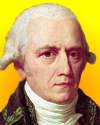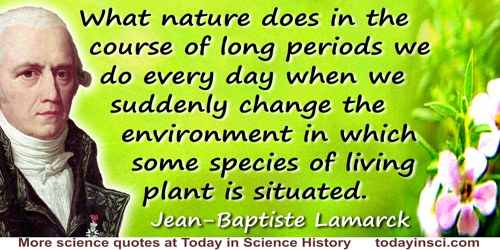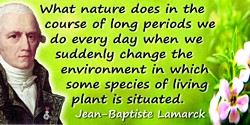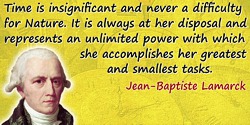 (source)
(source)
|
Jean-Baptiste Lamarck
(1 Aug 1744 - 18 Dec 1829)
French naturalist and biologist who was a pre-Darwinian evolutionist. Born in Bazentin, France, he is best known for his idea that acquired traits are inheritable (Lamarckism), which was replaced by Darwinian theory.
|
Jean-Baptiste Lamarck Quotes on Environment (4 quotes)
>> Click for 20 Science Quotes by Jean-Baptiste Lamarck
>> Click for Jean-Baptiste Lamarck Quotes on | Evolution | Nature |
>> Click for 20 Science Quotes by Jean-Baptiste Lamarck
>> Click for Jean-Baptiste Lamarck Quotes on | Evolution | Nature |
After having produced aquatic animals of all ranks and having caused extensive variations in them by the different environments provided by the waters, nature led them little by little to the habit of living in the air, first by the water's edge and afterwards on all the dry parts of the globe. These animals have in course of time been profoundly altered by such novel conditions; which so greatly influenced their habits and organs that the regular gradation which they should have exhibited in complexity of organisation is often scarcely recognisable.
— Jean-Baptiste Lamarck
Hydrogéologie (1802), trans. A. V. Carozzi (1964), 69-70.
It is not the organs—that is, the character and form of the animal's bodily parts—that have given rise to its habits and particular structures. It is the habits and manner of life and the conditions in which its ancestors lived that have in the course of time fashioned its bodily form, its organs and qualities.
— Jean-Baptiste Lamarck
Attributed.
Second Law
All the acquisitions or losses wrought by nature on individuals, through the influence of the environment in which their race has long been placed, and hence through the influence of the predominant use or permanent disuse of any organ; all these are preserved by reproduction to the new individuals which arise, provided that the acquired modifications are common to both sexes, or at least to the individuals which produce the young.
All the acquisitions or losses wrought by nature on individuals, through the influence of the environment in which their race has long been placed, and hence through the influence of the predominant use or permanent disuse of any organ; all these are preserved by reproduction to the new individuals which arise, provided that the acquired modifications are common to both sexes, or at least to the individuals which produce the young.
— Jean-Baptiste Lamarck
Philosophie Zoologique (1809), Vol. 1, 235, trans. Hugh Elliot (1914), 113.
What nature does in the course of long periods we do every day when we suddenly change the environment in which some species of living plant is situated.
— Jean-Baptiste Lamarck
Philosophie Zoologique (1809), Vol. 1, 226, trans. Hugh Elliot (1914), 109.
See also:
- 1 Aug - short biography, births, deaths and events on date of Lamarck's birth.
- Lamarck’s Open Mind: The Lectures, by Jean-Baptiste Lamarck. - book suggestion.




 In science it often happens that scientists say, 'You know that's a really good argument; my position is mistaken,' and then they would actually change their minds and you never hear that old view from them again. They really do it. It doesn't happen as often as it should, because scientists are human and change is sometimes painful. But it happens every day. I cannot recall the last time something like that happened in politics or religion.
(1987) --
In science it often happens that scientists say, 'You know that's a really good argument; my position is mistaken,' and then they would actually change their minds and you never hear that old view from them again. They really do it. It doesn't happen as often as it should, because scientists are human and change is sometimes painful. But it happens every day. I cannot recall the last time something like that happened in politics or religion.
(1987) -- 


